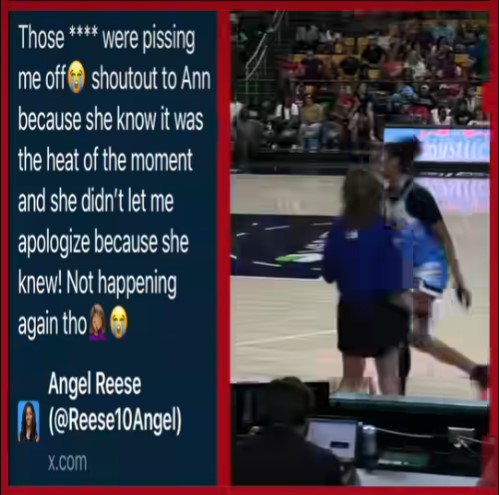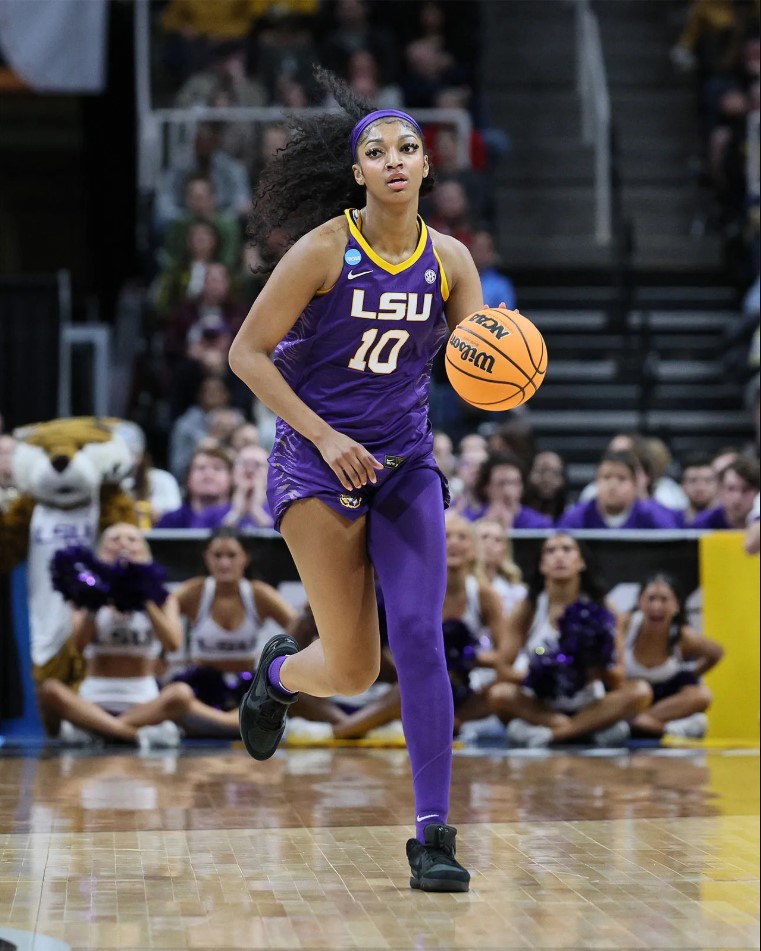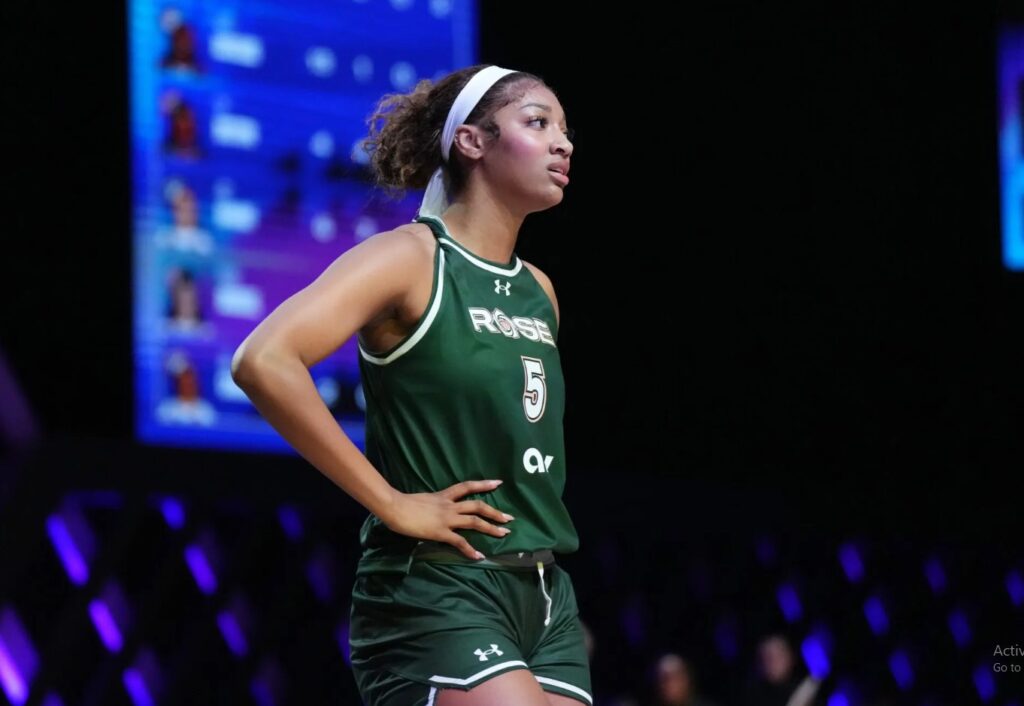WATCH: Angel Reese SNAPS — Clipboard Smack Sparks Explosive Reactions Across the Basketball World
In a moment that has set sports social media ablaze, Angel Reese — the rising WNBA superstar and self-proclaimed “Bayou Barbie” — shocked fans, critics, and even her own teammates when she appeared to slap a clipboard directly out of her coach’s hand during a heated third-quarter timeout confrontation.
The incident unfolded during what was already a tense and emotionally charged game, with the camera crew unknowingly capturing what would become one of the most talked-about sideline meltdowns in recent league memory, and perhaps a defining moment — for better or worse — in Reese’s young professional career.

According to multiple sources close to the team, the frustration that seemed to boil over in that instant had been quietly brewing for several games, fueled by inconsistent minutes, questionable coaching calls, and what some insiders describe as “a growing rift between player and staff behind closed doors.”
As the video rapidly gained traction online, fans across various platforms expressed a wide range of emotions, with some voicing concern over Reese’s emotional maturity and leadership ability, while others defended her passion and drive as proof of the competitive edge that made her a standout at LSU and beyond.
One viral comment summed up a popular sentiment among frustrated viewers: “She’s supposed to be a leader now — you don’t lead by throwing tantrums and disrespecting the very people trying to help you succeed at the next level of the game.”
On the other hand, defenders of Reese’s fiery reaction were quick to remind critics that greatness is often accompanied by emotional volatility, and that her outburst should be seen not as immaturity, but as the natural overflow of someone who refuses to accept mediocrity or poor communication under high-pressure circumstances.

This moment — frozen in time by a perfectly timed broadcast camera angle and circulated endlessly across TikTok, Twitter, and Instagram — now lives as a Rorschach test for basketball fans: depending on your perspective, it’s either the fall of a young icon or a necessary spark in a high-stakes professional environment.
For some, the scene of Reese storming toward the bench, swatting the clipboard mid-discussion, and walking off visibly agitated was a betrayal of professionalism and team spirit; to others, it was raw emotion from someone who holds herself to an elite standard and expects the same from her coaching staff.
No official statement has yet been released from the coach involved or from the franchise itself, which has only fueled further speculation about internal dynamics, disciplinary measures, and the overall leadership structure within the locker room — questions that fans and analysts alike are now demanding answers to.
What makes this episode particularly complicated is Reese’s dual role in the league: not only is she expected to contribute on the court, but as one of the most visible faces of the WNBA’s new generation, she also bears the weight of marketing, branding, and representing the league’s evolution on a global scale.
Critics argue that her platform and influence come with heightened responsibilities, and that public displays of disrespect — especially toward coaches in a professional setting — send the wrong message to young fans and aspiring players who look up to her as a symbol of empowerment and excellence.

Meanwhile, Reese’s supporters push back against the idea that athletes, especially Black women in sports, should be expected to perform emotional labor on top of their physical and strategic responsibilities, reminding us that male athletes have long been celebrated for similarly fiery outbursts without the same degree of scrutiny.
This double standard, they argue, is part of a broader pattern of policing emotion in women’s sports, where assertiveness is too often labeled “attitude,” and where leadership under pressure is mistaken for emotional instability or disrespect toward authority.
It’s worth noting that this is not the first time Angel Reese has stirred intense debate both on and off the court — her unapologetic personality, flashy style, and public statements have made her one of the most divisive figures in recent WNBA history, drawing equal parts admiration and backlash with every bold move.
The real question now is not simply whether her behavior was acceptable, but whether it warrants consequences from the team or the league, and if so, what kind of disciplinary action — if any — is appropriate given the context and the stakes.
Some fans are calling for a temporary benching or fine, suggesting that clear boundaries must be enforced to preserve the integrity of player-coach relationships and the professional environment of the league, especially with cameras and fans watching every moment.
Others argue that any punishment would be excessive and performative, designed to appease public pressure rather than address the root issues of communication, trust, and power dynamics between young athletes and veteran coaching staff.
What’s certain is that this moment — regardless of how it’s ultimately interpreted or handled — will follow Angel Reese for the rest of her career, etched into highlight reels and sports debates as one of those defining snapshots where passion collided with protocol.
Even if official statements are eventually released and the situation is addressed privately within the team, the public has already weighed in, turning what could have been a brief lapse in composure into a full-blown sports media firestorm.
As debate continues to rage online, with hashtags trending and pundits chiming in across TV and podcasts, Reese now faces the challenge of how to respond — will she double down, issue an apology, or simply let her performance in the next game do the talking?
The upcoming All-Star Game may now carry more emotional weight than ever, as fans and critics alike await her next appearance to see whether she reclaims her narrative or lets the backlash shape it — a high-stakes opportunity to remind the world why she became a star in the first place.
Because in today’s WNBA, where every move is scrutinized, every reaction captured, and every personality politicized, being a great player isn’t just about stats and wins — it’s about carrying yourself under the microscope and still finding a way to shine.
As for whether Angel Reese crossed a line or simply lit a fire under her team, one thing is for sure — the sports world is watching, the cameras are still rolling, and the next chapter of her story is already being written in real time.